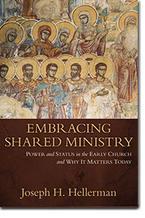 The following is the first in a series of faculty book announcements that will appear on the Good Book Blog in the coming months. Embracing Shared Ministry: Power & Status in the Early Church and Why It Matters Today, by Joseph H. Hellerman (Kregel Publications, 2013).
The following is the first in a series of faculty book announcements that will appear on the Good Book Blog in the coming months. Embracing Shared Ministry: Power & Status in the Early Church and Why It Matters Today, by Joseph H. Hellerman (Kregel Publications, 2013).
Joe, word has it that you have a new book out. What is the title, and what is the book about?
The book addresses issues of power and authority in the church—in the New Testament and in the church today—in what I hope is a fresh, culturally nuanced way. The first half of the book discusses Paul’s portrayal of Jesus in Philippians 2:6-11 (read against the background of ancient Roman cultural values), and the implications of Jesus’ take on status and authority for pastoral leadership today. The rest of the book then seeks to identify a social context for ministry that will provide healthy checks and balances on the use of pastoral power and authority in our congregations today.
Who is your target audience and how will they benefit from reading the book?
The book is designed as a textbook for persons training for church ministry in a Bible college or seminary setting. Embracing Shared Ministry will also be useful for seasoned pastors who find themselves frustrated or dissatisfied with the single-leader, CEO approach to church leadership that continues to influence much of our thinking about ministry today. The book is probably not one that your average parishioner will take the time to read, but I have learned never to underestimate the interest level and theological sophistication of the people in our churches.
What led you to write the book? How does this book relate to your previous scholarship? And how does it intersect with your classroom teaching at Talbot?
Embracing Shared Ministry arose from three related experiences as a pastor-scholar: (1) I had written and academic monograph on Philippians (Reconstructing Honor: Carmen Christi as Cursus Pudorum [Cambridge University Press, 2005]) that touched upon issues of power and authority in the early church. (2) In recent years, I have become a sounding board for students and colleagues in the pastorate who have been on the receiving end of authority abuse by senior pastors who lack (a) relational skills and (b) accountability for the way they manage their subordinates. (3) Finally, I happen to serve with a very healthy pastoral team, where, thankfully, the misuse of authority is kept in check.
As for the classroom, I teach an elective on Philippians at Talbot, and I teach a course titled The Church as Family. Embracing Shared Ministry fits right into the subject matter of both courses. Plus, I sneak in my convictions about church leadership in my other Greek exegesis classes wherever I can.
Can you share with our readers a small excerpt (a paragraph or so) from the book?
The following excerpt marks the transition in the book from the NT church (Chapters 1-6) to leadership in our congregations today (Chapters 7-9):
“Paul responded to his own cultural challenges by crafting a social context for ministry that would encourage Jesus-like leadership on the part of persons with power and authority in the Christian community.
Paul’s strategy, in this regard, was twofold. First, he reminded the Philippians that they now belonged to a new family. God was their Father. They were brothers and sisters in Christ. According to the Philippians’ own cultural values, this meant that the honor game was off-limits among those who sought to follow Jesus.
No longer would Christians in Philippi compete with fellow believers for the honor of their respective blood families, like they had done in the colony before they were saved. They would now defer in honor to their Christian siblings. And this honor would be granted to those who used their social capital in the service of others, after the example of Jesus, as portrayed in Philippians 2:6–11.
Secondly, Paul addressed the critical matter of church leadership. Paul’s approach here, as it turns out, was also distinctly relational. We find no evidence of one-person rule anywhere in the churches Paul established. A plurality of elders provided oversight to each local congregation. And as we have seen, Paul modeled team ministry in his own missionary journeys, as well, traveling with bands of like-minded persons throughout the eastern Roman Empire.
We gather from his letters, moreover, that Paul’s understanding of team leadership had little to do with organization and structure, and everything to do with relational mutuality. Paul would not be satisfied merely to have a set of church by-laws requiring a plurality of pastors. He would insist that such a team develop intimate relational bonds, as its members partner together to do the work of the ministry, whatever the formal structure of the church might happen to be.
Paul strategy was truly brilliant. He recognized that only in the social context of a healthy surrogate family—led by a plurality of individuals who relate to each other as siblings, and who lead in community together—could Jesus’ ideal of servant leadership triumph over the social values of the dominant culture and become a reality among the Philippian Christians.
I will maintain, in the pages to follow, that the same is the case for many of our churches in America today.” (Embracing Shared Ministry, 197-98).
In a sentence or two, what is the main “TAKE AWAY” you want your readers to get from your new book?
The local church should be led and taught by a community of leaders who relate to one another first as brothers and sisters in Christ, and who function only secondarily—and only within the parameters of that primary relational context—as vision-casting, decision-making leaders for the broader church family. That, in a nutshell, is the thesis of Embracing Shared Ministry.
 Biola University
Biola University

.jpg)
.jpg)